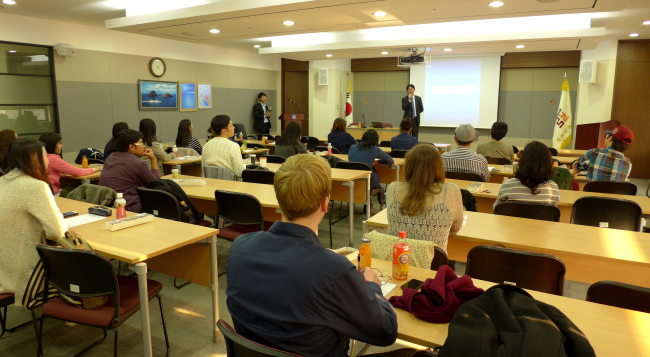Foundation promotes East Asian cooperation with history lessons
By Korea HeraldPublished : Nov. 2, 2014 - 19:55
Foreign residents are gaining insights into the Korean identity and culture at the Northeast Asian History Foundation’s classes every Wednesday.
The Northeast Asian History Academy, a crash course on Korean history, is an eye opener to those who want to deepen and broaden their understanding of Korea in the wider context of East Asia.
The participants must be adults and possess certified Korean language level 4 or higher. There are currently 50 students from nine different countries enrolled in the 15-week-long course, which runs twice a year.
Students can get a chronicled overview of Korean history from ancient times through to the contemporary period. Special lectures by outside professors delve into some of the most controversial geopolitical topics, such as the Dokdo Islets dispute, China’s interpretation of Northeast Asian territorial history and Japanese history textbooks.
There are field trips scheduled in conjunction with the classes to Ganghwado Island, Ulleungdo Island and the Dokdo Islets, and the DMZ.
“History is the basic point of departure for all other discussions,” said Moritz Haarstick, 24, from Bremen, Germany, who is an exchange student at Korea University and enrolled in the program.
Korea being relatively unknown in Germany, Haarstick said it was like “uncharted territory” to explore academically. The cost of living in Japan and the environmental and safety conditions in China also prompt many international students to choose Korea as an alternative, he added.
The Northeast Asian History Academy, a crash course on Korean history, is an eye opener to those who want to deepen and broaden their understanding of Korea in the wider context of East Asia.
The participants must be adults and possess certified Korean language level 4 or higher. There are currently 50 students from nine different countries enrolled in the 15-week-long course, which runs twice a year.
Students can get a chronicled overview of Korean history from ancient times through to the contemporary period. Special lectures by outside professors delve into some of the most controversial geopolitical topics, such as the Dokdo Islets dispute, China’s interpretation of Northeast Asian territorial history and Japanese history textbooks.
There are field trips scheduled in conjunction with the classes to Ganghwado Island, Ulleungdo Island and the Dokdo Islets, and the DMZ.
“History is the basic point of departure for all other discussions,” said Moritz Haarstick, 24, from Bremen, Germany, who is an exchange student at Korea University and enrolled in the program.
Korea being relatively unknown in Germany, Haarstick said it was like “uncharted territory” to explore academically. The cost of living in Japan and the environmental and safety conditions in China also prompt many international students to choose Korea as an alternative, he added.

“There are Japanese and Chinese students taking this course and they may not feel comfortable discussing some historical subject matters, but even after an intense debate, everyone goes back home smiling,” Haarstick said. “The whole point is to listen to each other and their differing narratives to reach the truth.”
Haarstick said the quality of the lectures was higher than some of his university classes, and the lecturers were passionate about educating and engaging the students. They are similar to the history classes in Germany, which are centered on discussion and debate, rather than relying on the one-way lecturing style typical of Korean history classes.
The foundation was established in 2006 under the Ministry of Education to “overcome tensions and confrontations in East Asia related to the diverging historical viewpoints and territorial claims” and to “pave the way for a correct understanding of history for mutual prosperity and peace.”
Through its research and analysis of history and policy, the institute aims to create an academic community devoted to building trust and reconciliation in East Asia.
The foundation’s secretary-general, Seok Tong-youn, who spent nearly four decades as a diplomat in China, Hong Kong and Australia, oversees the curriculum.
Seok told The Korea Herald, “Regional cooperation is a global trend nowadays. It would be a grave mistake if the East Asian countries did not progress together due to their historical conflicts. Korea, Japan and China must avoid extreme nationalism and instead work together to strengthen friendship and harmony in the region. That is the lesson of history.”
By Joel Lee (joel@heraldcorp.com)
-
Articles by Korea Herald








![[Graphic News] More Koreans say they plan long-distance trips this year](http://res.heraldm.com/phpwas/restmb_idxmake.php?idx=644&simg=/content/image/2024/04/17/20240417050828_0.gif&u=)
![[KH Explains] Hyundai's full hybrid edge to pay off amid slow transition to pure EVs](http://res.heraldm.com/phpwas/restmb_idxmake.php?idx=644&simg=/content/image/2024/04/18/20240418050645_0.jpg&u=20240419100350)






![[From the Scene] Monks, Buddhists hail return of remains of Buddhas](http://res.heraldm.com/phpwas/restmb_idxmake.php?idx=652&simg=/content/image/2024/04/19/20240419050617_0.jpg&u=20240419175937)

![[KH Explains] Hyundai's full hybrid edge to pay off amid slow transition to pure EVs](http://res.heraldm.com/phpwas/restmb_idxmake.php?idx=652&simg=/content/image/2024/04/18/20240418050645_0.jpg&u=20240419100350)

![[Today’s K-pop] Illit drops debut single remix](http://res.heraldm.com/phpwas/restmb_idxmake.php?idx=642&simg=/content/image/2024/04/19/20240419050612_0.jpg&u=)